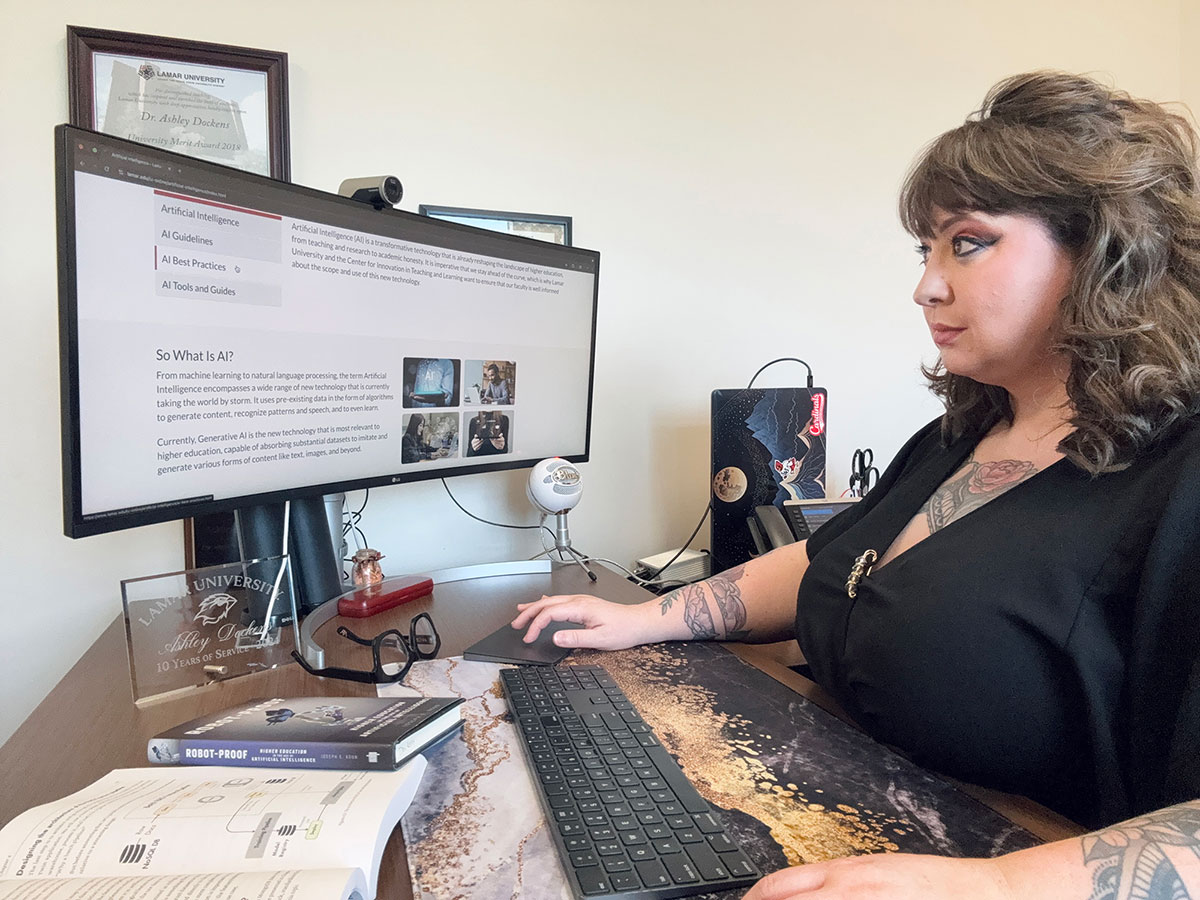
Like everyone, Lamar University is dealing with the rise of AI and its role in higher education and society at large.
Ashley Dockens, associate provost of academic innovation & digital learning, defines artificial intelligence, or AI, as the development and use of computer systems that simulate human intelligence to perform tasks that typically require a person’s cognitive abilities.
“This includes skills like learning, reasoning, problem-solving and decision-making,” she said.
AI is an emerging technology that learns from our way of “thinking” and “acting,” Dockens said.
“Generative AI (GAI) is a subset of modern artificial intelligence that creates new, original content rather than just analyzing existing data,” she said. “Unlike traditional AI that might classify information or make predictions based on patterns, GAI uses models trained on vast amounts of data to produce text, images, code, audio and even video.”
Generative AI can create original content from a user’s request.
“Generative models have been used for years in statistics to analyze numerical data,” IBM’s website states. “But over the last decade, they evolved to analyze and generate more complex data types.”
Students can find GAI programs, such as Microsoft Copilot, helpful when searching for ideas, Christy Black, LU data management officer and staff innovation liaison, said.
“I always like to think of it as something that people can use to get those ideas, to help draft emails,” she said. “It always gives you an initial draft, and then you always have to vet the output. Think of AI as something that you always have to make sure that it’s giving you the most accurate information, and that you have to vet it using your critical thinking skills.”
AI is beneficial for students, staff and faculty, Dockens said.
It’s essentially a tool for creation and reasoning, capable of producing realistic and novel outputs that didn’t exist before but are based on original human creations,” she said.
AI can also help students understand concepts they may not be familiar with, Dockens said.
“What I think is interesting is you can go in from a class where you’ve had a hard topic— you sort of get it, but you sort of don’t,” she said. “You can (say) to something like AI, ‘OK, explain quantum physics to me like I’m five years old,’ and it will give you a different way to look at it.”
Critical thinking is still important when using AI because one has to make sure the information is correct, Black said.
“Even if you love something it created, taking the time to make sure it sounds like you, that it represents what you meant for it to say, that it’s correct, is always going to be important,” Dockens said.
One danger associated with AI is misinformation, Dockens said. Users should remember that is a literal assistant.
“If your instructions are not very clear, it’ll go in a direction you don’t expect it to,” she said. “You might not realize it, depending on how it’s responded, you have to treat it very literally. This is exactly, precisely what I need you to do to get the good output from it.”
AI taking over jobs is a concern, Dockens said, but showing employee value minimizes the risk of losing jobs.
“You need to know how to use it, to show that you’re sort of superhuman,” she said. “I could do all these things by myself, but if I use AI, I can do this much more. But this is why I’m still important — showing that value.”
Dockens said AI can also aid students with disabilities, such as rapidly suit various needs.
“One of the best ideas that I have seen come from AI is that you can very quickly alter things about an assignment to assist with very specific needs,” she said.
AI will continue to increase in popularity as a tool to help users build ideas, Black said.
“It’s a starting point of learning,” she said. “It’s going to be one of those things that we eventually utilize every day, just like we do our phone.”
Similar to the internet, AI is going to be a part of daily life we take for granted, Dockens said.
“I think it already is integrated into a lot of our things without us really thinking about it,” she said.
For more, visit lamar.edu/lu-online/artificial-intelligence.
